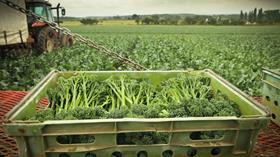
Leaving the EU has meant the UK will have to reassess its self-sufficiency and trading potential in certain products, so it seems as good a time as any to focus on UK production of an increasingly popular vegetable.
Herefordshire growers Andrew and Caroline Green first began producing Tenderstem, the Sakata-owned brassica hybrid, nine years ago at the request of their firm AS Green’s primary customer, exotics importer Wealmoor.
It was somewhat of an experiment, according to Sakata UK MD and Tenderstem expert Stuart Cox, as the plant had been initially developed for the warmer climes of Kenya, so no one envisaged how well it would take to the Greens’ Malvern Hills land. “They almost have their own microclimate, being close enough to the Malvern Hills, which keeps temperatures fairly cool,” says Cox.
Green adds: “Tenderstem likes to be kept moist, and we are damper here than the east coast. It’s been unexpectedly successful in Herefordshire.”
In total, the Greens grow 250 acres of Tenderstem, alongside their original crop of runner beans (90 acres), baby courgettes (70 acres) and broad beans (60 acres). In addition, the pair also farm 500 sheep, which are fattened on a diet of Tenderstem by-products.
Tenderstem is by all accounts bucking the trend in the wider vegetable category, which has seen widespread price deflation, with traditional brassicas often bearing the brunt. In comparison, Tenderstem, which is marketed by brand manager Coregeo, continues to see double-digit year-on-year growth. “That’s the amazing thing – total vegetables are in gradual decline, broccoli is flat, but Tenderstem is still increasing. Instead of a niche broccoli, it’s becoming a category in its own right,” explains Cox, who has been on board since the beginning and has tracked its progress among UK growers.
Arriving in the UK in the mid 1990s, Tenderstem was taken up by growers in Lincolnshire, who saw little success due to the high-intensity production in the area. “There were few indications about the level of success Tenderstem would have at that stage,” continues Cox.
Years later, and consumer-driven demand for the product led retailers to establish permanent import programmes from key producer Kenya, before inevitably spotting the potential in UK production. Alongside AS Green, Tenderstem is now produced by six other growers in the country, including Barfoots on the south coast and Staples in Lincolnshire.
Growth in the immediate future may come from the foodservice sector, Cox believes, which has previously been slightly behind Tenderstem’s growth at retail level. “Foodservice and catering are really catching up, the presentation is really nice for foodservice. We’ve developed the retail side of it and now foodservice is doing the same. In the US that’s the other way round,” he says. Traditionally, Brits like purple sprouting, so visually they recognise Tenderstem. That’s something that is more difficult on the continent. And that’s one reason why the UK market took off so quickly.”
There is currently only one commercial variety of Tenderstem available – Inspiration – although Cox notes there is plenty of varietal work being done both in Japan and the UK. “For UK growers, we really need a longer-cycle variety to help us through the summer. It takes 65 days to grow Tenderstem, which is relatively fast for brassicas. Andrew slows it down here, which is good as it’s almost too fast for our summer climate otherwise. Andrew also has a very good rotation, as the Tenderstem doesn’t follow other brassica crops.
“We have a full-time breeder in Japan and have development work in Lincolnshire so there is lots in the pipeline. We are reacting to what growers need. It would be nice to get a variety that is more cold tolerant, and one that is more heat tolerant. Flavour and sweetness is something we really want to keep, as that is one of its unique attributes,” he says, adding that this can sometimes be a challenge as pests are as attracted to taste as consumers.
Green says: “Tenderstem is susceptible to aphids and caterpillars, as well as brassica pest Diamond Back Moth. We are now moving towards pre-treatment of plants, and we’ve also considered insect nets. We had to spray recently due to the DBM problem. It’s difficult because breeding for sweetness can attract the pests.”
The UK season could be extended slightly, according to Green, who says it currently runs for around six months from 1 June to the end of November. “We could potentially go two weeks earlier, and one week later. Our biggest challenge is to get children to eat vegetables, and they eat Tenderstem because it’s sweet,” he adds.
With strong consumer demand and ongoing R&D on production, the UK Tenderstem story looks set to remain sweet for both consumers and industry.



